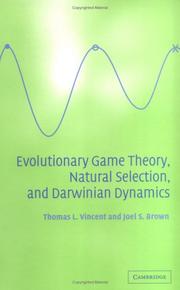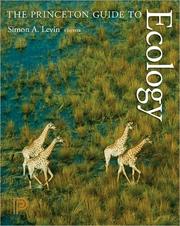| Listing 1 - 4 of 4 |
Sort by
|
Article
Abstract | Keywords | Export | Availability | Bookmark
 Loading...
Loading...Choose an application
- Reference Manager
- EndNote
- RefWorks (Direct export to RefWorks)

ISBN: 9780521841702 0521841704 9780511542633 9781107406513 0511113439 9780511113437 0511112920 9780511112928 0511542631 1280415878 9781280415876 1107151422 9786610415878 0511181639 0511198477 0511299389 Year: 2005 Publisher: Cambridge New York Cambridge University Press
Abstract | Keywords | Export | Availability | Bookmark
 Loading...
Loading...Choose an application
- Reference Manager
- EndNote
- RefWorks (Direct export to RefWorks)
All of life is a game, and evolution by natural selection is no exception. The evolutionary game theory developed in this 2005 book provides the tools necessary for understanding many of nature's mysteries, including co-evolution, speciation, extinction and the major biological questions regarding fit of form and function, diversity, procession, and the distribution and abundance of life. Mathematics for the evolutionary game are developed based on Darwin's postulates leading to the concept of a fitness generating function (G-function). G-function is a tool that simplifies notation and plays an important role developing Darwinian dynamics that drive natural selection. Natural selection may result in special outcomes such as the evolutionarily stable strategy (ESS). An ESS maximum principle is formulated and its graphical representation as an adaptive landscape illuminates concepts such as adaptation, Fisher's Fundamental Theorem of Natural Selection, and the nature of life's evolutionary game.
Evolution --- Natural selection --- Game theory --- Théorie des jeux --- Mathematical models --- Modèles mathématiques --- Game theory. --- Mathematical models. --- Théorie des jeux --- Modèles mathématiques --- Games, Theory of --- Theory of games --- Mathematics --- Darwinism --- Selection, Natural --- Genetics --- Variation (Biology) --- Biological invasions --- Evolution (Biology) --- Heredity --- Philosophy --- Creation --- Emergence (Philosophy) --- Teleology

ISBN: 0226772659 1281966568 9786611966560 9780226772653 9780226772639 0226772632 9780226772646 0226772640 9781281966568 6611966560 Year: 2007 Publisher: Chicago University of Chicago Press
Abstract | Keywords | Export | Availability | Bookmark
 Loading...
Loading...Choose an application
- Reference Manager
- EndNote
- RefWorks (Direct export to RefWorks)
Foraging is fundamental to animal survival and reproduction, yet it is much more than a simple matter of finding food; it is a biological imperative. Animals must find and consume resources to succeed, and they make extraordinary efforts to do so. For instance, pythons rarely eat, but when they do, their meals are large-as much as 60 percent larger than their own bodies. The snake's digestive system is normally dormant, but during digestion metabolic rates can increase fortyfold. A python digesting quietly on the forest floor has the metabolic rate of thoroughbred in a dead heat
Animals --- Animal diets --- Animal feeding behavior --- Animal food --- Animal food habits --- Animal foods --- Animals, Food habits of --- Feeding behavior in animals --- Food habits in animals --- Food of wild animals --- Foraging behavior in animals --- Animal behavior --- Food --- Food. --- Feeding behavior --- Food habits --- Foods --- Foraging behavior --- ecology, ecological, behavior, behavioral, evolution, evolutionary, biology, sciences, scientific, biological, imperative, foraging, foragers, cognitive science, anthropology, conservation, economics, neurobiology, technology, cognition, population, community, mammals, amphibians, food, eating, survival, neuroethology, energy storage, social interactions, diversity, dynamics, free distribution, provisioning, animals, wildlife.


ISBN: 1782682961 1282692135 9786612692130 184972699X 1400833027 0691128391 0691156042 9781400833023 0391128396 9780391128392 9780691156040 9780691128399 9781782682967 9781282692138 6612692138 9781849726993 Year: 2009 Publisher: Princeton, NJ
Abstract | Keywords | Export | Availability | Bookmark
 Loading...
Loading...Choose an application
- Reference Manager
- EndNote
- RefWorks (Direct export to RefWorks)
The Princeton Guide to Ecology is a concise, authoritative one-volume reference to the field's major subjects and key concepts. Edited by eminent ecologist Simon Levin, with contributions from an international team of leading ecologists, the book contains more than ninety clear, accurate, and up-to-date articles on the most important topics within seven major areas: autecology, population ecology, communities and ecosystems, landscapes and the biosphere, conservation biology, ecosystem services, and biosphere management. Complete with more than 200 illustrations (including sixteen pages in color), a glossary of key terms, a chronology of milestones in the field, suggestions for further reading on each topic, and an index, this is an essential volume for undergraduate and graduate students, research ecologists, scientists in related fields, policymakers, and anyone else with a serious interest in ecology. Explains key topics in one concise and authoritative volume Features more than ninety articles written by an international team of leading ecologists Contains more than 200 illustrations, including sixteen pages in color Includes glossary, chronology, suggestions for further reading, and index Covers autecology, population ecology, communities and ecosystems, landscapes and the biosphere, conservation biology, ecosystem services, and biosphere management
Ecology. --- Ecology --- Economic aspects. --- Ecological economics --- Balance of nature --- Biology --- Bionomics --- Ecological processes --- Ecological science --- Ecological sciences --- Environment --- Environmental biology --- Oecology --- Electronic monograph. --- Environmental sciences --- Population biology
| Listing 1 - 4 of 4 |
Sort by
|

 Search
Search Feedback
Feedback About UniCat
About UniCat  Help
Help News
News